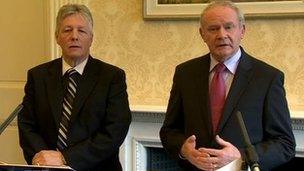Shared future: How ambitious is Stormont's latest peace plan?
- Published
- comments

Peter Robinson and Martin McGuinness unveiled the peace initiatives at Stormont Castle
Northern Ireland's first and deputy first ministers have been promising us ambitious plans on a shared future in recent weeks, but providing nothing in the way of detail.
On Thursday, we were summoned to Stormont Castle and presented with a list of initiatives.
So how ambitious were they?
A target date of 2023 for bringing down the peace walls and other barriers is certainly eye catching - although it would have come as more of a shock if the BBC had not obtained a draft of the 10-year plan back in January.
I joked with one official that we should really headline Thursday night's story: "Stormont delays removal of walls by a year."
Despite that, it is refreshing to hear local ministers committing themselves to such an ambitious goal.
Tensions
In the past they have left it to visiting VIPs like the New York Mayor Michael Bloomberg to tell them that a city divided by physical barriers sends out all the wrong messages, external to the world.
Drawing up a target is easier than achieving it, and many of those who live in the shadow of the peace walls will - especially after the tensions over the union flag dispute - fear the potential consequences of any premature removal.
But the direction of travel is hard to argue with.
Peter Robinson and Martin McGuinness's peace plan is definitely a decimal document.
Ten years to bring down the walls, ten new shared educational campuses, ten new shared neighbourhoods, 100 summer camps and 10,000 placements for young people not in work, training or education.
You can see why they didn't opt for 13 as the common denominator.
Whether they achieve all the round numbers will be interesting to assess - one Alliance politician I bumped into claimed it was proving impossible to fill the training places for young people already on offer. But again, the aspiration appears laudable.
'Rehash'
Not so long ago a visiting foreign diplomat asked me why Stormont did not introduce a form of national service to promote citizenship amongst disaffected young people.
I explained why differences over national identity and/or military service would make such an idea a non-starter.
That said, the "United Youth Programme", with its emphasis on citizenship, sharing, work experience and volunteering sounds as close as Stormont could get.
Along with an emphasis on cross community sports, few could reject the idea outright, although some might wonder how new such schemes are.
Predictably other Stormont parties have given the DUP-Sinn Fein announcement a dusty response - the SDLP called it a rehash of the items previously under discussion as part of the Cohesion, Sharing and Integration (CSI) strategy.
Alliance described it as a collection of "one-off, back of the envelope initiatives".
But in a previous era, London and Dublin often came in for criticism when they sought to break deadlocks by putting their heads together then pushing forward with their best guess at a compromise everyone could live with.
In the devolved era, the DUP and Sinn Fein find themselves playing a a slightly similar role, although the fact that they are dealing with their electoral opponents adds an extra edge to the cross-party discord.
Pressure
Will an independent chair be able to broker deals on flags, parades and the past when the previous Stormont working group has failed to reach a consensus?
That will depend not only on the personality and experience of the individual, but also whether they are seen to have sufficient authority.
Although the first and deputy first ministers argue there is no real connection, it is undeniable that Thursday's step forward followed pressure from the secretary of state and the prime minister, linking fresh economic support to the need for more progress on a shared future.
The US government was quick to welcome the Stormont announcement.
It may be that Washington, London and Dublin still have a role to play, either by putting their diplomatic weight behind whoever chairs the cross-party talks on flags, parades and the past or perhaps by contributing some much needed fresh ideas for how to go about cracking these hardest of hard nuts.